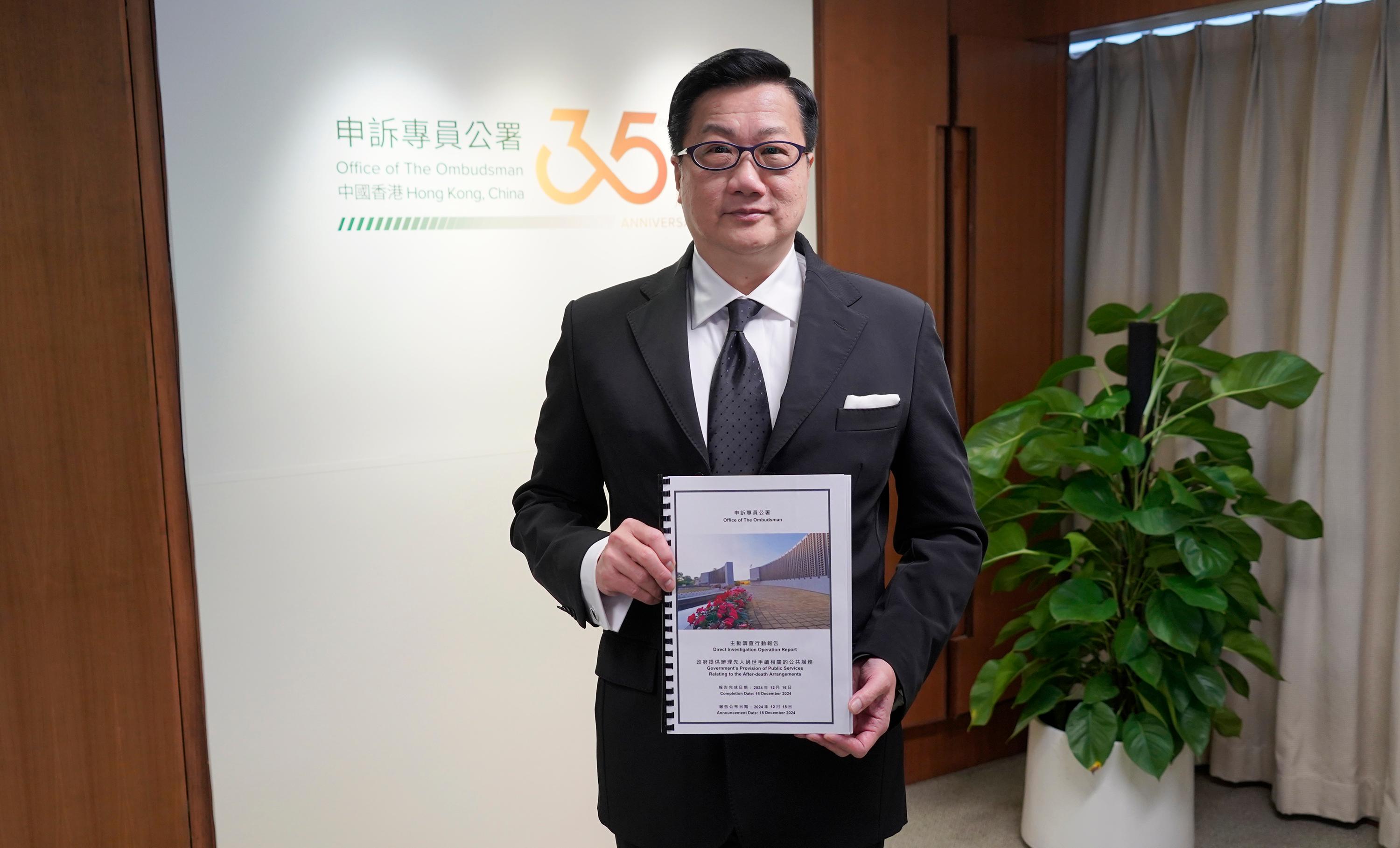LCQ15: Reform of laws on sexual offences
Following is a question by Dr the Hon Tik Chi-yuen and a written reply by the Acting Secretary for Security, Mr Michael Cheuk, in the Legislative Council today (December 18):
Question:
It has been reported that the Police have pointed out that the number of child sexual abuse cases involving online activities increased by more than 15 per cent year-on-year last year. On the other hand, there are views that, although the Mandatory Reporting of Child Abuse Bill, which was passed by this Council in July this year, requires specified professionals to report cases suspected to involve online sexual grooming and sexual exploitation, the existing laws fail to provide comprehensive protection for the victimised children and young people after reporting. Moreover, it is learnt that the Law Reform Commission of Hong Kong published reports (i.e. Review of Substantive Sexual Offences, and Sentencing and Related Matters in the Review of Sexual Offences) in 2019 and 2022 respectively, putting forward recommendations for reforming sexual offences (including discarding of the term rape and creating a range of non-consensual sexual offences, as well as creating a range of new sexual offences involving children and persons with mental impairment (PMIs)). However, the Government has yet to legislate on the relevant recommendations. In this connection, will the Government inform this Council:
(1) of the progress of the Government's work in implementing the more than 70 recommendations made in the aforesaid two reports, and whether it has drawn up a specific legislative timetable; if so, of the details (including which issues relating to the reform of the laws on sexual offences will be accorded priority); if not, the reasons for that;
(2) how the authorities handle cases reported under the Mandatory Reporting of Child Abuse Ordinance which are suspected to involve online sexual grooming and sexual exploitation; whether they have reviewed if such cases can be handled with the existing laws, so as to prevent suspected abusers from getting away without being punished;
(3) of the following information about the cases in which the Police made arrests involving rape offences in each of the past five years: (i) the number of victims (with a breakdown by age, gender (including (a) male, (b) female and (c) transgender) and mental conditions (i.e. (A) persons of sound mind and (B) PMIs)), (ii) the number of persons arrested, (iii) the number of persons arrested who were eventually charged with rape, and (iv) the number of persons arrested who were eventually charged with indecent assault instead (set out in Tables 1 and 2 respectively);
Table 1
| Year | (i) | (ii) | (iii) | (iv) | ||
| Age | gender | Number of persons | ||||
| 2019 | below 18 | (a) | ||||
| (b) | ||||||
| (c) | ||||||
| 18 or above | (a) | |||||
| (b) | ||||||
| (c) | ||||||
| …… | below 18 | (a) | ||||
| (b) | ||||||
| (c) | ||||||
| 18 or above | (a) | |||||
| (b) | ||||||
| (c) | ||||||
| 2023 | below 18 | (a) | ||||
| (b) | ||||||
| (c) | ||||||
| 18 or above | (a) | |||||
| (b) | ||||||
| (c) | ||||||
Table 2
| Year | (i) | (ii) | (iii) | (iv) | |
| Mental conditions | Number of persons | ||||
| 2019 | (A) | ||||
| (B) | |||||
| …… | (A) | ||||
| (B) | |||||
| 2023 | (A) | ||||
| (B) | |||||
(4) among the cases mentioned in (3), (i) the circumstances and reasons leading to the charge against the arrested persons being changed to indecent assault, and (ii) the number of cases referred to the Social Welfare Department for provision of support for the victims; and
(5) of the number of sexual offence cases involving persons under the age of 16 and online activities in each of the past five years (with a breakdown by the type of cases (including (i) sexual blackmail/fraud and (ii) involving actual sexual assault) and, among them, the number of cases in which prosecutions were instituted and the number of convicted cases (set out in Table 3)?
Table 3
| Year | Type of cases | Number of cases | Number of cases in which prosecutions were instituted | Number of convicted cases |
| 2019 | (i) | |||
| (ii) | ||||
| …… | ||||
| …… | (i) | |||
| (ii) | ||||
| …… | ||||
| 2023 | (i) | |||
| (ii) | ||||
| …… |
Reply:
President,
The Government attaches great importance to the handling of sexual offence cases as well as the well-being of children and young people, and is committed to protecting them from sexual abuse. In consultation with the Labour and Welfare Bureau and the Hong Kong Police Force (HKPF), the consolidated reply is set out below.
(1) The Law Reform Commission of Hong Kong (LRC) published a report on Review of Substantive Sexual Offences in December 2019 and, subsequently in May 2022, a report on Sentencing and Related Matters in the Review of Sexual Offences. The two reports cover the subjects of four consultation papers of the LRC in the past ten-odd years, including rape and other non-consensual sexual offences, sexual offences involving children and persons with mental impairment, miscellaneous sexual offences, and sentencing and related matters in the review of sexual offences. They cover principle-based recommendations as well as those involving making substantive legislative amendments, including the creation of a range of non-consensual sexual offences (for example, a range of new sexual offences involving children and persons with mental impairment which are gender neutral), the proposed penalties for the offences, treatment and rehabilitation of sex offenders, and a review on the Sexual Conviction Record Check Scheme.
The two reports have extensive coverage and contain over 70 recommendations. The Government is studying the reports and will propose legislative amendments with reference to the development of relevant laws in other jurisdictions. We plan to conduct public consultation on the implementation of the proposed legislative amendments in the two reports within 2025 and submit them to the Legislative Council for consideration at a suitable juncture.
(2) The Mandatory Reporting of Child Abuse Ordinance (the Ordinance) requires specified professionals to report serious child abuse cases, including "any harm caused by coercing or enticing a child to take part in rape, incest, buggery, sexual intercourse or any act of gross indecency" as stipulated in item 3 of Schedule 2 to the Ordinance. Upon the commencement of the Ordinance, the HKPF will, as always, investigate all reported offences and determine whether prosecution should be instituted on the basis of the evidence, irrespective of whether or not the case is reported through the reporting platform under the Ordinance and whether the act involved in the case took place online.
(3) The HKPF has all along adopted the age of 21 as the dividing line for the purpose of collating statistics on offences involving children and young people. For the offence of rape, the HKPF does not break down and maintain statistics on the number of victims aged below 18 and their mental conditions. Statistics on rape cases in the past five years, including the number of cases, the number of victims by age and sex, the number of persons arrested, and the number of completed prosecutions, are set out in Table 1 below. The HKPF does not maintain statistics on the number of cases in which the charge was changed from rape to indecent assault, the number of persons arrested, and the number of cases in which the victims were persons of sound mind or with mental impairment.
Table 1: Statistics on rape cases
| Year | Number of Cases | Number of Victims | Persons Arrested | Number of Completed Prosecution Cases (Note 2) | ||||
| Number of Victims | Aged 21 below | Aged 21 or above | ||||||
| Male (note 1) | Female (note 1) |
Male (note 1) |
Female (note 1) |
|||||
| 2019 | 50 | 50 | 0 | 23 | 0 | 27 | 46 | 34 |
| 2020 | 64 | 64 | 0 | 36 | 0 | 28 | 59 | 24 |
| 2021 | 79 | 79 | 0 | 39 | 0 | 40 | 81 | 32 |
| 2022 | 53 | 53 | 0 | 27 | 0 | 26 | 56 | 34 |
| 2023 | 67 | 67 | 0 | 29 | 0 | 38 | 70 | 31 |
Note 1: The gender of the victims of the cases is recorded according to the gender on their identity documents. The HKPF does not keep statistics on the number of victims who are transgender persons.
Note 2: Figures refer to the number of cases concluded in the calendar year, not necessarily those for which prosecution proceedings commenced in the same calendar year.
(4) As mentioned above, the HKPF does not maintain statistics on the number of cases in which the charge was changed from rape to indecent assault, and therefore does not maintain statistics on the circumstances and reasons for the said change of charge. The HKPF and the Social Welfare Department (SWD) also do not maintain statistics on the number of rape cases referred by the HKPF to the SWD for support.
(5) Cases of blackmail relating to pornographic fraud mainly involve the criminal conduct of "naked chat" blackmail, while those involving actual sexual offences include rape, indecent assault, unlawful sexual intercourse, gross indecency, incest, unlawful buggery, etc. (sexual offences against children). Statistics on the number of cases of "naked chat" blackmail and sexual offences against children in the past five years are set out in Table 2 below. The HKPF does not maintain statistics on the number of prosecutions and convictions in respect of these cases.
For the age of victims of "naked chat" blackmail cases, the HKPF uses the age of 21 as the dividing line for the purpose of collating statistics; and for sexual offences against children, in accordance with the definition in the Criminal Procedure Ordinance, a child is a person under the age of 17. The HKPF does not break down and maintain statistics on the number of victims under the age of 16 for the abovementioned two offences.
Table 2: Statistics on the number of cases of "naked chat" blackmail and "sexual offences against children"
| Year | Number of cases of "naked chat" blackmail with victims under the age of 21 | Number of cases of "sexual offences against children" |
| 2019 | 45 | 422 |
| 2020 | 389 | 386 |
| 2021 | 401 | 599 |
| 2022 | 297 | 578 |
| 2023 | 444 | 696 |

